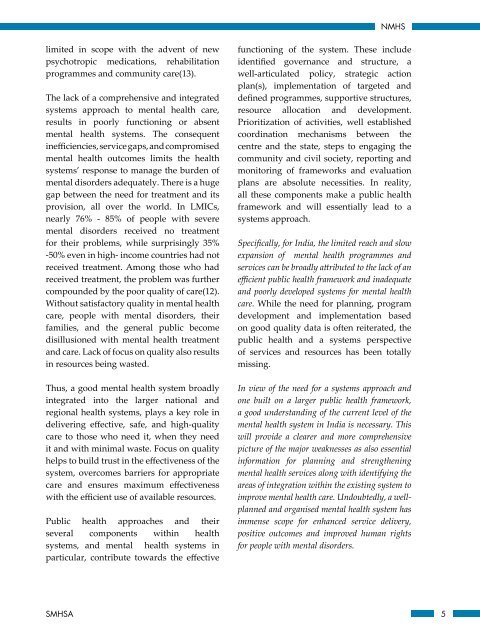National Mental Health Survey of India 2015-16
NMHS%20Report%20%28Mental%20Health%20Systems%29%201
NMHS%20Report%20%28Mental%20Health%20Systems%29%201
Create successful ePaper yourself
Turn your PDF publications into a flip-book with our unique Google optimized e-Paper software.
NMHS<br />
limited in scope with the advent <strong>of</strong> new<br />
psychotropic medications, rehabilitation<br />
programmes and community care(13).<br />
The lack <strong>of</strong> a comprehensive and integrated<br />
systems approach to mental health care,<br />
results in poorly functioning or absent<br />
mental health systems. The consequent<br />
inefficiencies, service gaps, and compromised<br />
mental health outcomes limits the health<br />
systems’ response to manage the burden <strong>of</strong><br />
mental disorders adequately. There is a huge<br />
gap between the need for treatment and its<br />
provision, all over the world. In LMICs,<br />
nearly 76% - 85% <strong>of</strong> people with severe<br />
mental disorders received no treatment<br />
for their problems, while surprisingly 35%<br />
-50% even in high- income countries had not<br />
received treatment. Among those who had<br />
received treatment, the problem was further<br />
compounded by the poor quality <strong>of</strong> care(12).<br />
Without satisfactory quality in mental health<br />
care, people with mental disorders, their<br />
families, and the general public become<br />
disillusioned with mental health treatment<br />
and care. Lack <strong>of</strong> focus on quality also results<br />
in resources being wasted.<br />
Thus, a good mental health system broadly<br />
integrated into the larger national and<br />
regional health systems, plays a key role in<br />
delivering effective, safe, and high-quality<br />
care to those who need it, when they need<br />
it and with minimal waste. Focus on quality<br />
helps to build trust in the effectiveness <strong>of</strong> the<br />
system, overcomes barriers for appropriate<br />
care and ensures maximum effectiveness<br />
with the efficient use <strong>of</strong> available resources.<br />
Public health approaches and their<br />
several components within health<br />
systems, and mental health systems in<br />
particular, contribute towards the effective<br />
functioning <strong>of</strong> the system. These include<br />
identified governance and structure, a<br />
well-articulated policy, strategic action<br />
plan(s), implementation <strong>of</strong> targeted and<br />
defined programmes, supportive structures,<br />
resource allocation and development.<br />
Prioritization <strong>of</strong> activities, well established<br />
coordination mechanisms between the<br />
centre and the state, steps to engaging the<br />
community and civil society, reporting and<br />
monitoring <strong>of</strong> frameworks and evaluation<br />
plans are absolute necessities. In reality,<br />
all these components make a public health<br />
framework and will essentially lead to a<br />
systems approach.<br />
Specifically, for <strong>India</strong>, the limited reach and slow<br />
expansion <strong>of</strong> mental health programmes and<br />
services can be broadly attributed to the lack <strong>of</strong> an<br />
efficient public health framework and inadequate<br />
and poorly developed systems for mental health<br />
care. While the need for planning, program<br />
development and implementation based<br />
on good quality data is <strong>of</strong>ten reiterated, the<br />
public health and a systems perspective<br />
<strong>of</strong> services and resources has been totally<br />
missing.<br />
In view <strong>of</strong> the need for a systems approach and<br />
one built on a larger public health framework,<br />
a good understanding <strong>of</strong> the current level <strong>of</strong> the<br />
mental health system in <strong>India</strong> is necessary. This<br />
will provide a clearer and more comprehensive<br />
picture <strong>of</strong> the major weaknesses as also essential<br />
information for planning and strengthening<br />
mental health services along with identifying the<br />
areas <strong>of</strong> integration within the existing system to<br />
improve mental health care. Undoubtedly, a wellplanned<br />
and organised mental health system has<br />
immense scope for enhanced service delivery,<br />
positive outcomes and improved human rights<br />
for people with mental disorders.<br />
SMHSA<br />
5


